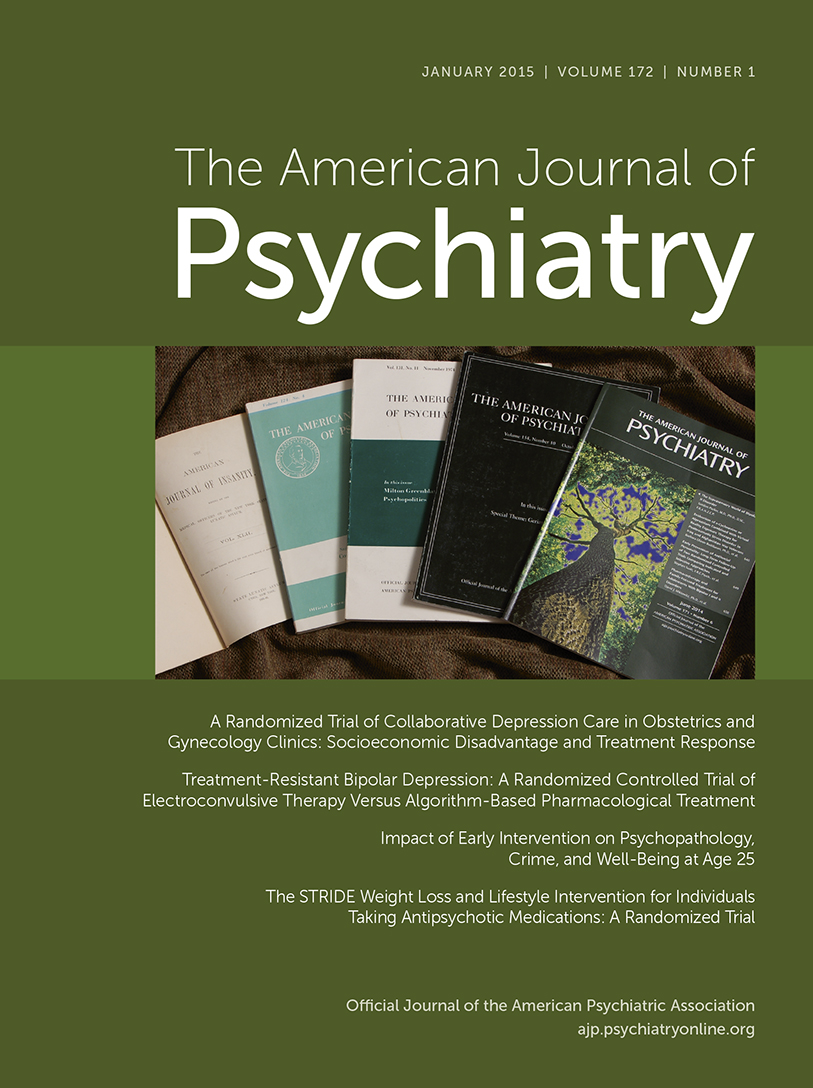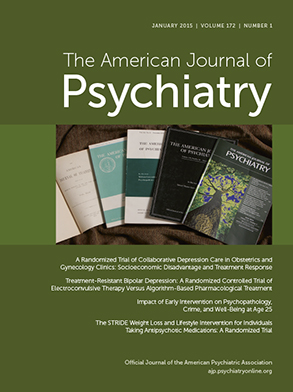Adults with serious mental illness represent the single greatest and least recognized health disparity in the nation, reflected in a 13- to 30-year reduced life expectancy (
1,
2). The primary cause of this epidemic of early mortality is cardiovascular disease associated with disproportionately high rates of obesity and tobacco use (
1). Paradoxically, “behavioral health” organizations have been remarkably unengaged in providing evidence-based “health behavior” interventions aimed at preventing chronic health conditions (
3) associated with early mortality and health care costs that are two to three times greater in adults with serious mental illness compared with general patient populations (
4,
5). The reasons for our failure to engage in a serious effort to treat obesity are likely manifold: lack of expertise, a long-standing schism between physical and mental health care, acceptance of weight gain as an inevitable side effect of antipsychotic medications, and, perhaps most insidiously, a pervasive pessimism regarding our capacity to effectively treat obesity and regarding the ability of people with mental illness to embrace health behavior change (
6).
A study by Green et al. (
7) in this month’s issue of the
Journal adds to an emerging evidence base challenging many of these beliefs and assumptions. Outcomes of a randomized trial of the STRIDE weight loss and lifestyle intervention demonstrate that behavioral interventions for obesity in persons with serious mental illness can result in clinically significant reduction in weight and diabetes risk, even when delivered by routine community mental health centers (
7). In this study of 200 persons taking antipsychotic medications, those who were randomly assigned to STRIDE lost an average of 4.4 kg (9.7 lbs) and 2.6 kg (5.7 lbs) at 6 and 12 months, respectively, compared with those assigned to usual care. Using a widely accepted threshold for clinically significant weight loss associated with decreased cardiovascular risk (loss of ≥5% body weight), almost one-half (47%) of those receiving STRIDE achieved this benchmark at 12 months. These findings of reduced cardiovascular risk are remarkably consistent with outcomes of other behavioral interventions for overweight and obese persons with serious mental illness, including the ACHIEVE (Randomized Trial of Achieving Healthy Lifestyles in Psychiatric Rehabilitation) study (37.8% experienced clinically significant weight loss) (
8) and the In SHAPE study (49% obtained clinically significant weight loss or clinically significant improvement in cardiovascular fitness) (
9).
The STRIDE intervention consists of weekly 2-hour group meetings focused on acquiring behavioral self-management skills with 20 minutes of physical activity, delivered over 6 months, followed by 6 months of maintenance groups. The core components include the DASH (Dietary Approaches to Stop Hypertension) diet aimed at weight loss and reducing the risk of developing cardiovascular disease, with a goal of at least 25 minutes of moderate physical activity per day, as well as daily self-monitoring of food intake, calorie consumption, exercise, and sleep. STRIDE adds further evidence to reviews concluding that clinically significant reduction of cardiovascular risk in overweight and obese persons with serious mental illness is most likely to occur in a program of sufficient duration (at least 6 months) that includes both nutrition and exercise and that consists of active learning, coaching, and self-monitoring (
10,
11). Of significance, weight loss was obtained regardless of antipsychotic medication weight gain propensity, a finding also described in the ACHIEVE (
8) and In SHAPE (
9) studies.
The STRIDE study also presents several novel findings of particular significance. STRIDE was delivered as an integrated component of routine outpatient community mental health services across multiple sites. In contrast, the ACHIEVE trial was conducted in a day treatment program (including providing two meals each day) (
8), and the initial In SHAPE randomized trial was limited to a single community mental health center (
9). Compared with usual care, the STRIDE intervention was also associated with a significant decline in fasting glucose, in contrast to previous behavioral interventions targeting obesity in mental illness that failed to reduce fasting glucose levels (
12). Finally, to our knowledge, this is the first study to demonstrate an impact of a behavioral weight loss intervention in persons with serious mental illness on acute medical service use. Among STRIDE participants, 6.7% experienced a medical hospitalization during the period of study, compared with 18.8% of control group participants. Although the modest size of the sample warrants significant caution, if replicated, this finding is of critical significance in the argument for financing health promotion as a core Medicaid service within mental health settings.
Despite these highly promising results, maintaining weight loss over the long-run remains a major (and unsolved) challenge. For persons with mental illness, we do not know how long we need to provide behavioral interventions to obtain sustained change in lifestyle and maintained weight loss. Although STRIDE was associated with a greater proportion of participants compared with usual care achieving ≥5% weight loss at 6 months, this difference was not statistically significant at 12 months at the end of the maintenance phase. Because the STRIDE, ACHIEVE, and In SHAPE trials only report weight loss outcomes following intervention withdrawal, it is not possible to determine whether these benefits are maintained long-term. However, there is reason to be optimistic. In a recently completed multisite replication trial of the In SHAPE lifestyle intervention, clinically significant cardiovascular risk reduction was found in 51% of participants at 12 months and in 46% at the 18-month follow-up (a slight decline that was not statistically significant) 6 months after the intervention was fully withdrawn (
13). This recent trial also represents the first replication study demonstrating that similar results of a specific health coaching intervention can be achieved and sustained in multiple community mental health organizations serving an ethnically diverse population.
We also do not know how to engage individuals with serious mental illness who are not interested or ready to participate in lifestyle change. Similar to other behavioral trials, STRIDE recruited participants who were willing and motivated to engage in a weight loss intervention. This may have contributed to the remarkably high rate of improvement found in the usual care control group: an impressive 36% achieved ≥5% weight loss at the 12-month follow-up. In addition, all participants (regardless of assignment to intervention or control) were referred to a primary care physician for treatment if they had an abnormal lipid value, elevated fasting glucose or HbA1c, or high blood pressure. This may have contributed to weight loss in the control group by significantly enhancing “usual care.” In brief, an inherent limitation of randomized behavioral intervention trials is that they are highly likely to recruit a sample of individuals already in an advanced stage of motivation and readiness to change.
Despite these caveats, it is safe to conclude that behavioral interventions for obesity in people with serious mental illness should be considered an evidence-based practice. A series of randomized trials clearly demonstrate that clinically significant reduction in cardiovascular risk is possible for approximately one-half of overweight and obese individuals with mental illness participating in behavioral interventions consisting of active coaching in dietary modification and physical activity (
7–
9,
13).
The greatest current barrier to increasing the life expectancy of persons with serious mental illness is no longer a knowledge gap—it is an implementation gap. Integrated health promotion is not a part of the core mission, capacity, competency, and, most importantly, usual array of programs among Medicaid-reimbursable services provided by most community mental health organizations. However, recent reforms within the Affordable Care Act provide potential (though limited) opportunities to incorporate prevention and health promotion through mechanisms (
14) such as the Medicaid 1915(i) State Plan Home and Community-Based Services program (
15) and adaptations of the Specialty Health Home program (
16). We currently have the knowledge to begin to stem the tide of early mortality in persons with serious mental illness. The time is now to launch a culture change across America’s mental health system embracing health promotion as a core integrated component of routine services.

